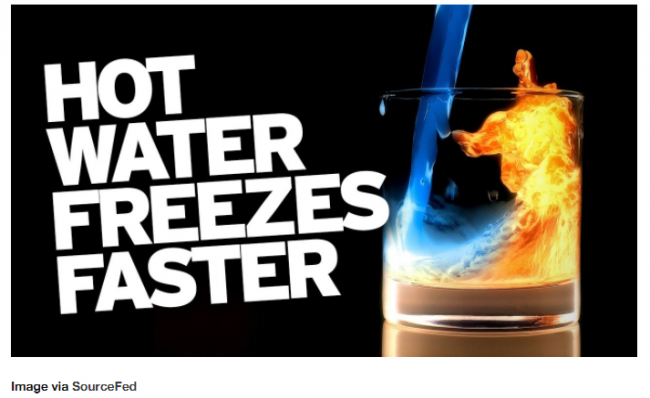In the late of 17th century British scientist Isaac Newton gave a well-known and important law explaining the cooling of a body by radiating its heat to its surroundings. According to the law, rate of loss of heat (dQ/dt) or cooling of body is directly proportional to the temperature difference between the body and its surroundings, given as: dQ/dt α (TS−T) => dQ/dt= βA(TS−T), where Q is the heat, A is the surface area of the body through which the heat is transferred, T and TS is the temperature of the body and surrounding environment respectively, whereas β is the heat transfer coefficient and depends on the geometry of the body, state of the surface, heat transfer mode, and other factors. As Q=CT, where C is the heat capacity of the body, it can be written as dT/dt=αAC(TS−T) = k(TS−T) and the given differential equation has the solution in the form: T(t)=TS+(T0−TS) exp (−kt), where T0 denotes the initial temperature of the body. The cooling rate depends on the parameter k= βAC. With increase of the parameter k (for example, due to increasing the surface area), the cooling occurs faster.
If other conditions remain same, it is clear from the law that cooling of the body directly depends on the temperature difference between the body and its surroundings. From this, it is generally said that bodies of same nature at higher temperature cool faster as compared to cold ones in the same environment. However, as the loss of heat is exponential in nature and therefore it is faster for hot body initially but at longer times the rate of loss almost coincides for both hot and cold bodies and the rate of loss almost becomes same. Now, the question which is always asked is weather a hot water will freeze faster than cold in a freezer. It is to mention that hot water can in fact freeze faster than cold water for a wide range of experimental conditions and this phenomenon is extremely counterintuitive, and surprising even to most scientists. But this is in fact a real phenomenon and has been seen and studied in numerous experiments. In this article, we will try to explore the physics behind the process and try to bring out the answer to the question.
The Mpemba effect is a process in which hot water can freeze faster than cold water and the phenomenon is temperature-dependent. It is named after Tanzanian schoolboy Erasto Bartholomeo Mpemba (born 1950) who discovered it in 1963 at the age of thirteen years only. As hot water placed in an open container begins to cool, the overall mass decreases as some of the water evaporates and thus with less water to freeze, the process can take less time, thus, evaporation is the strongest candidate to explain the Mpemba effect. There is still some disagreement about the parameters required to produce the effect and about its theoretical basis but in 2020 Nature published a paper that sought to “outline the generic conditions needed to accelerate heat removal and relaxation to thermal equilibrium and support the idea that the Mpemba effect is not simply a scientific curiosity concerning how water freezes into ice – one of the many anomalous features of water – but rather the prototype for a wide range of anomalous relaxation phenomena of broad technological importance”.
The experiments studying this phenomenon have always been muddled by the complexities of water and the freezing process, making results difficult to reproduce and leaving scientists disagreeing over the cause of the effect, its definition and whether it is real or not. Recently, a new experiment with the study of tiny glass beads suggests that the Mpemba effect is real and hints at how hot water can freeze faster than cold. Any warmer system when chilled to cool off takes less time than a cooler system to reach the same low temperature. And in some cases, the speedup was even exponential, physicists report in the Aug. 6, 2020 Nature magazine. To sidestep the experimental complexities, Avinash Kumar and John Bechhoefer, both of Simon Fraser University in Burnaby, Canada, used tiny glass beads, 1.5 micrometers in diameter, in lieu of water and tried to define Mpemba effect based on cooling instead of the more complicated process of freezing. According to the researchers, this is the first time that an experiment can be claimed as a clean, perfectly controlled experiment that demonstrates this effect.
In the experiment, a bead represented the equivalent of a single molecule of water, and the measurements were performed 1000 times under a given set of conditions to produce a collection of molecules. A laser exerted forces on each bead produced an energy landscape or potential. Meanwhile, the bead was cooled in a bath of water. The effective “temperature” of the beads from the combined trials could be derived from how they traversed the energy landscape, moving in response to the forces imparted by the laser. To study how the system cooled, the researchers tracked the beads’ motions over time. The beads began at either a high or a moderate temperature, and the researchers measured how long it took for the beads to cool to the temperature of the water. Under certain conditions, the beads that started out hotter cooled faster, and sometimes exponentially faster, than the cooler beads. In one case, the hotter beads cooled in about two milliseconds, while the cooler beads took 10 times as long.
However, the same experiment can be repeated with similar effects for water is to be seen because water is more complex, including the quirks of impurities in the water, evaporation and the possibility of super cooling, in which the water is liquid below the normal freezing temperature. But the simplicity of the study is part of its beauty and it is hoped that such experiments can be also performed directly with water in near future to give a clear answer to the mystery of “hot water freezes faster than cold water”. Scientists suggest that the Mpemba effect could go beyond glass beads or water and this effect might be appearing quite generically in nature elsewhere but without any attention.
Further reading
- https://medium.com/the-physics-arxiv-blog/why-hot-water-freezes-faster-than-cold-physicists-solve-the-mpemba-effect-d8a2f611e853
- https://www.sciencealert.com/does-hot-water-really-freeze-faster-than-cold-water
- https://www.scientificamerican.com/article/is-it-true-that-hot-water/
- https://www.sciencenews.org/article/physics-new-experiment-hot-water-freeze-faster-cold-mpemba-effect
- https://math.ucr.edu/home/baez/physics/General/hot_water.html



